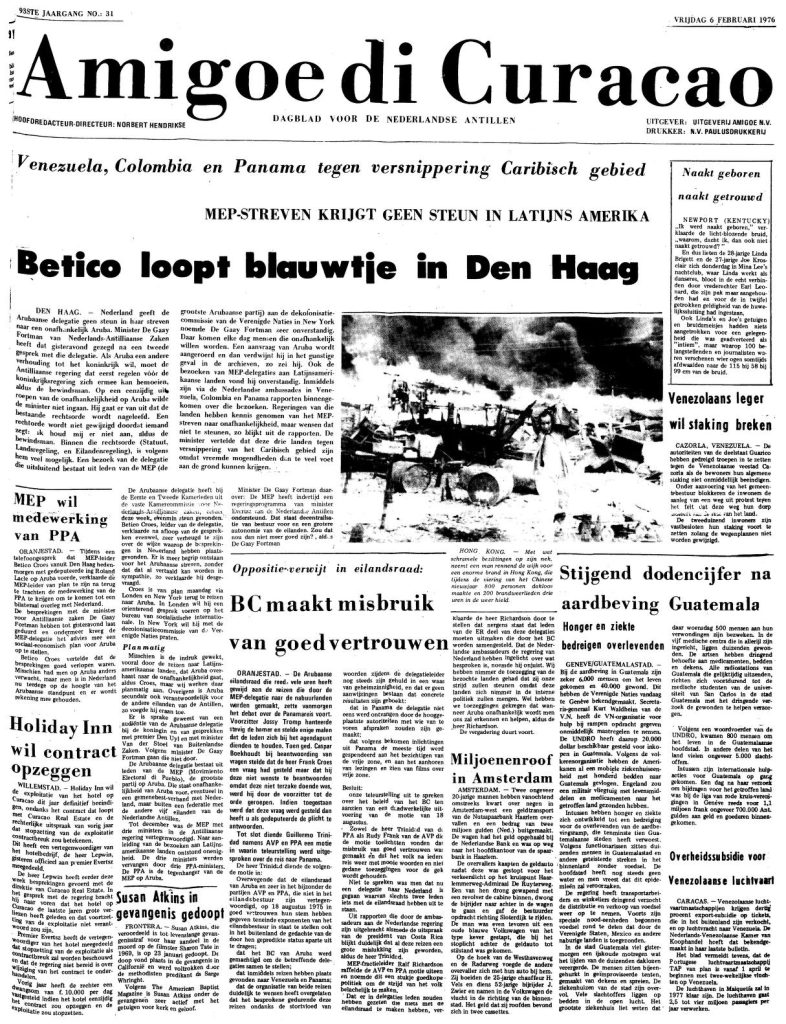
ORANGE CITY February 6, 1976. During a telephone conversation that MEP leader Betico Croes had from The Hague this morning with deputy ing. Roland Lacle in Aruba this morning, the MEP leader stated his intention to try to obtain the cooperation of the PPA in order to reach a bilateral consultation with the Netherlands after his return. Discussions with the Minister for Antillean Affairs De Gaay Fortman lasted until late last night and, among other things, the MEP delegation was advised to draw up a socio-economic plan for Aruba.
Betico Croes said the talks had gone well. Perhaps people in Aruba expected otherwise, but they are now well aware of the Aruban position in the Netherlands and it is being taken into account.
Plan
Perhaps the impression has been created, especially through the trips to Latin American countries, that Aruba is rushing toward independence, Croes said, but we are working on it in a planned manner. Incidentally, Aruba has secondary responsibility for the other islands of the Antilles, he added. There has been an audience of the Aruban delegation with the queen and talks with Prime Minister Den Uyl and Foreign Minister Van der Stoel. According to Minister De Gaay Fortman, these are not going ahead.
The Aruban delegation consists of members of the MEP (Movimiento Electoral di Pueblo), the largest party in Aruba. It advocates independence for Aruba, possibly in a commonwealth with the Netherlands, but outside a federation with the other five islands of the Netherlands Antilles. Until December, the MEP was represented by three ministers in the Antillean government. Following visits to Latin American countries, disagreement arose. The three ministers were replaced by three PPA ministers. The PPA is the counterpart of the MEP in Aruba.
WHACK JOB GETS NO SUPPORT IN LATIN AMERICA
Betico runs blue in The Hague
THE HAGUE. The Netherlands does not support the Aruban delegation in its pursuit of an independent Aruba. Minister De Gaay Fortman of Dutch-Antillean Affairs said so last night after a second conversation with that delegation. If Aruba wants a different relationship to the kingdom, the Antillean government must first settle that before the central government can interfere, the minister said. The minister did not want to comment on a unilateral declaration of independence in Aruba. He assumes that the existing legal order will be respected. A legal order is not changed because someone says: I do not abide by it, according to the minister.
Within that legal order (Statute, State Regulation and Island Regulation), a lot is possible, according to him. A visit of the delegation consisting exclusively of MEP (the largest Aruban party) to the decolonization commission of the United Nations in New York was called very unwise by De Gaay Fortman. People who want to become independent come there every day. An application from Aruba is touched upon and then it disappears into the archives at best, he said. He also found the visits of MEP delegations to Latin American countries unwise.
Reports of those visits have since come in through the Dutch embassies in Venezuela, Colombia and Panama. Governments of those countries have taken note of the MEP push for independence but do not wish to support it, according to the reports. The minister explained that these three countries are against fragmentation of the Caribbean because foreign powers could then gain too much of a foothold.
Opposition blaming in island council:
BC abuses good faith
ORANGE CITY. - The Aruban Island Council, which has already devoted many hours to the trips made by the MEP delegation to neighboring countries, continued the debate on the Panama trip this morning. Chairman Jossy Tromp wielded the gavel firmly and stated several times that members should stick to the agenda item. When Delegate Caspar Boekhoudt, in answering questions, stated that Mr. Frank Croes had asked a question but did not wish to answer it because it was irrelevant, he was called to order by the chairman. If it was allowed that this question was asked then as deputy he has a duty, to answer.
Finally, Guillermo Trinidad made a motion on behalf of AVP and PPA expressing disappointment with the trip to Panama. Mr. Trinidad made the following motion:
Whereas
- That the Island Council of Aruba and very particularly the parties AVP and PPA, which are not represented in the Island Council, on August 18, 1975, gave their votes in good faith in order to enable exponents of the Island Council to propagate abroad as well the idea of the separate status they preached;
- That the BC of Aruba was authorized to compose the relevant delegations;
- That meanwhile trips have taken place to Venezuela and Panama;
- That the organization of both trips clearly left much to be desired;
- That what has been discussed during these trips despite the torrent of words on the part of the leader of the delegation are still shrouded in a haze of secrecy, and that there is no indication that concrete results have been achieved;
- That in Panama the delegation was not even received by the high-level authorities with whom arrangements would have been made in advance;
- That according to information obtained from Panama, most of the time was spent touring the free zone, and hearing lectures and seeing films about the free zone.
Decision:
To express our disappointment with the BC's policy on effective implementation of the August 18 motion.

